Posted by Elena del Valle on July 26, 2023
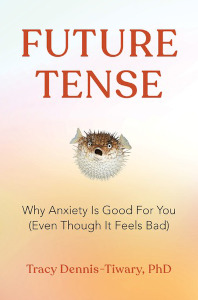
Future Tense
Photos: HarperCollins Publishers, Jenny Anderson
In Future Tense Why Anxiety Is Good For You (Even Though It Feels Bad) (Harper Wave, $29.99) Tracy Dennis-Tiwary, Ph.D. shares her views on the importance of anxiety in our lives. The 237-page hardcover book was published in 2022. She explains in the book that anxiety acts like fear yet contains qualities of hope.
The emotion addresses concerns about an uncertain future, the author says. As a result it causes us to become aware of potential threats and makes us see the discrepancies between where we are in the present and where we want to be in the future. According to Dennis-Tiwary, anxiety arises from the intersection of the brain’s automatic, ancient and reflexive functions and its deliberative and cognitively sophisticated ones. Anxiety, she says in the book, provokes the production of cortisol as well as oxytocin.

Tracy Dennis-Tiwary, Ph.D.
The author says in the book that anxiety evolved to provide what we need, to “guide and motivate us to change situations” for our benefit while at the same time managing its built-in unpleasantness. According to her website bio Dennis-Tiwary is a scientist and entrepreneur as well as a professor of psychology and neuroscience, director of the Emotion Regulation Lab at Hunter College, The City University of New York, and co-founder of Arcade Therapeutics, where she translates “neuroscience research into gamified, clinically validated digital therapeutics for mental health.”
Comments:
Filed Under: Books
Posted by Elena del Valle on July 12, 2023

The Future of Money
Photo: The Belknap Press of Harvard University Press
In The Future of Money How the Digital Revolution Is Transforming Currencies and Finance (The Belknap Press of Harvard University Press, $35) Eswar Prasad outlines the basics of money today and explores what the future might bring. Published in 2021 the 485-page hardcover book is divided into four sections and 10 chapters as well as extensive end notes. There were no replies to email requests for an interview from the publishing company or from Prasad’s email address.
In the book he expresses the belief that Central Bank Digital Currencies (CBDCs) are likely to be a part of our future; and that the use of digital payments in lieu of cash will displace privacy in commercial transactions. He says that despite the loss of privacy they bring financial technologies have the potential to improve the economic conditions for many, especially the poor and economically marginalized.
He describes two main types of CBDCs, wholesale and retail. Wholesale refers to transactions between the central bank and banks and financial payment companies. Retail refers to individuals and businesses. Within retail there are three categories, according to the author: e-money such as the digital money payment services like PayPal and Venmo offer as well as that offered by pioneering central banks like the Riksbank in Sweden; a second option, more technologically sophisticated, is an account based CBDC through which individuals and businesses would have accounts directly at the central banks; and an officially sanctioned cryptocurrency, a form of digital currency designed to operate on “permissioned blockchains.”
Cryptocurrencies instead of bypassing governments and affording users some anonymity may have the opposite effect at the expense of individual liberties, he speculates. In the final chapter he explains that such changes won’t solve all problems; corruption, lax government, the advantages of the elites and inequality will continue to plague society.
According to his book jacket bio at the time the book was published Prasad was the Tolani senior professor of Trade Policy and professor of economics at Cornell University; he was a senior fellow at the Brookings Institution, where he held the New Century Chair in International Economics; and a research associate at the National Bureau of Economic Research. His other titles include Gaining Currency: The Rise of Renminbi and The Dollar Trap: How the U.S. Dollar Tightened its Grip on Global Finance.
Comments:
Filed Under: Books
Posted by Elena del Valle on June 7, 2023
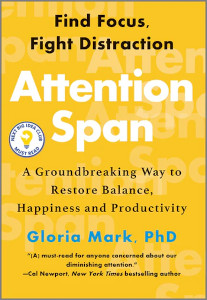
Attention Span
Photo: Hanover Press
Gloria Mark, Ph.D., professor, Informatics at the University of California, Irvine, believes she has found a new concept that identifies how our brains work in the digital world. She calls it kinetic attention and describes why she thinks it may help readers of Attention Span: A Groundbreaking Way to Restore Balance, Happiness and Productivity (Hanover Press, $28.99), her new book, to gain control of their productivity.
The 360-page hardcover book, published earlier this year, is divided into 14 chapters and three main parts: The Anatomy of Attention, The Underlying Forces of Distraction and Focus, Rhythm and Balance. In the book she explains that although we are in the Wild West era of the digital age we should be able to modify and manage the digital world despite the many pressing challenges it poses in our daily lives. Each of us has the power to determine where to focus our attention regardless of the many forces seeking to draw our attention toward them, according to the author.
Mark has been a visiting senior researcher at Microsoft Research since 2012, according to the biography in her book. She did not reply to requests for an interview or to answer questions submitted via email to a representative from her publishing company.
Comments:
Filed Under: Books
Posted by Elena del Valle on May 17, 2023
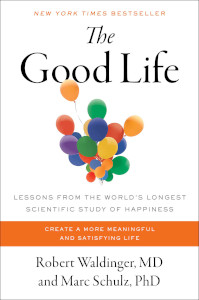
The Good Life
Photos: cover photo courtesy of Simon and Schuster, Robert Waldinger photo by Katherine Taylor, Marc Schulz photo by Ann Chwatsky
Robert Waldinger, Ph.D., director, Harvard Study of Adult Development, and Marc Schulz, Ph.D., associate director of the same study, believe healthy relationships are key to happiness. They explain their reasons in The Good Life Lessons From the World’s Longest Scientific Study of Happiness (Simon and Schuster, $28.99), a 341-page hardcover book published this year.
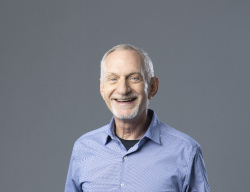
Robert Waldinger, Ph.D., co-author, The Good Life
Along with reading, writing and arithmetic the authors propose that social fitness should be taught to children and included in public policy considerations. It should also be an important part of adult lives; emphasis on relationships, they say in the book, pays off.
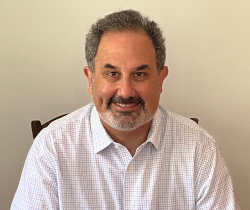
Marc Schulz, Ph.D., co-author, The Good Life
The authors reached their conclusions based on the findings of the Harvard Study of Adult Development, a multi-generational volunteer study conducted by Harvard researchers among students beginning in 1938, and later paired with a study of area non students from disadvantaged backgrounds. In total more than 2,000 people, a high percentage of the initial participants and their descendants, shared personal information, answered questions over their lives, provided blood samples, and in some cases donated their brains after their passing in furtherance of the study goals.
Waldinger and Schulz discuss the study findings in the book while weaving stories around the lives of some of the participants (keeping their identities private) and their relatives. It’s never too late, the authors say, about finding happiness and changing attitudes and behaviors. Life is in many ways, at least for the study participants, about the joys offered by relationships rather than financial successes, it seems. The authors acknowledge that some participants may have altered their views and behaviors as a result of their participation in the study.
Comments:
Filed Under: Books
Posted by Elena del Valle on March 22, 2023
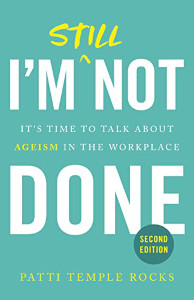
I’m Still Not Done
Photos: Patti Temple Rocks
Patti Temple Rocks, a communicator with four decades of experience, according to her biography, is troubled by corporate ageism. In the second edition of “I’m Still Not Done: It’s Time to Talk About Ageism In The Workplace (Lioncrest Publishing), a 237-page paperback nonfiction title published last year, she discusses her experiences with ageism and her views on combating it.
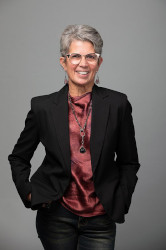
Patti Temple Rocks, author, I’m Still Not Done
“Ageism is the only form of workplace discrimination that all of us are susceptible to,” Temple Rocks said in a book related press release. “The sad truth is that organizations who don’t value their older workers are missing out on the unique wisdom and dedication that these employees bring to the table.”
As of this writing the author is unavailable for an interview according to a publicist who responded by email. She didn’t respond to questions submitted to her publicist.
The book is divided into nine chapters. According to promotional materials Temple Rocks has held senior leadership positions in three sectors of the communications industry: public relations, advertising, and client side; she served as chief communications officer for The Dow Chemical Company, and chief reputation officer for Leo Burnett Worldwide. She is a self-described public speaker and consultant.
Comments:
Filed Under: Books
Posted by Elena del Valle on February 22, 2023
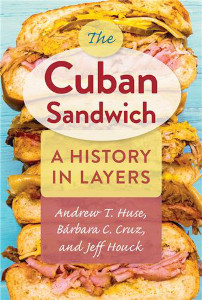
The Cuban Sandwich
Photos: University of Florida Press, Andrew Huse photo by Rion Sabean
Bárbara C. Cruz, Jeff Houck and Andrew Huse, three Florida Cuban sandwich aficionados, teamed up to research and write a book about the popular hand food. In The Cuban Sandwich (University Press of Florida, $24.95), a 167-page paperback book published last year, they explore the origins and evolution of the famed sandwich popular among many Floridians.
When asked how many months or years the book project required Andrew Huse replied by email: “I started with more than a year of sustained research, followed by the collaboration with my co-authors, which lasted another year, including peer review.”
“I published previous work woith Univbersity Press of Florida before and I like to work with them,” Huse said when asked about finding a publisher. “Before that, I offered it to another academic press, but they didn’t seem to know what to do with it.”
Their primary target audience? Huse said, “Sandwich and history fans!”
“I measure our success by the end product, which I am happy with,” said Huse when asked how he will measure success.”All sales and attention are a bonus!” Houck’s reply to the same questions is “Adding a page to the history of this great sandwich and the people who created it and find new ways to make and celebrate its greatness is its own reward.”
When asked whether they received compensation of any kind from third parties to be included in the book Houck’s said, “No. As I said, I am Vice President of Marketing for the Columbia Restaurant and the 1905 Family of Restaurants, but at no time was I compensated by them for inclusion in this book.”
Cruz is professor of Social Science Education at the University of South Florida (U.S.F.). Houck is vice president of marketing for the 1905 Family of Restaurants in Tampa. Huse is curator of Florida Studies at the University of South Florida Libraries.
Comments:
Filed Under: Books
Posted by Elena del Valle on January 11, 2023
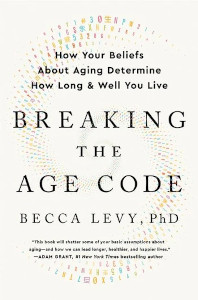
Breaking the Age Code by Becca Levy, Ph.D.
Photo: William Morrow
Becca Levy, Ph.D., professor of Epidemiology, Yale University, is convinced ageism affects the health and longevity of many, particularly in the United States where ageism is pervasive and absorbed from an early age. In Breaking the Age Code How Your Beliefs About Aging Determine How Long and Well You Live (William Morrow, $28.99), a 294-page hardcover book published in 2022 she outlines her thoughts on the subject. The book is divided into 10 chapters and four appendices.
In her book she describes four ways ageist principles become entrenched into our beliefs and guide our self dialogue and behavior before we reach old age; she explains some of her research findings and the conclusions she and others have drawn about the elders among us, including ways in which they surpass younger individuals; and proposes steps to address and halt the harmful effects ageist beliefs produce.
In the United States ageist thoughts have been identified in children as young as three, according to her book. Adopting ageist beliefs as children makes them part of a person’s long term stereotypes, she says, pointing to a study of Canadian and American teenagers who already see old people as “slow and confused.” In Chapter 1 she identifies three pathways ageism follows: psychological, behavioral and biological. Negative age beliefs, she says, can increase stress and that in turn might lead to an earlier death than in the absence of such beliefs.
Ageism combined with other prejudices and related behaviors, such as sexism and racism, for example, can aggravate existing conditions, she says in Chapter 8. In Appendix 1 she addresses ways readers might boost positive age beliefs; the following appendix examines structural ageism such as the exclusion of older people in clinical trials even when the trials are for illnesses that afflict mainly older adults. The author declined to respond to multiple email requests via her publisher to answer questions or be interviewed.
According to her bio Levy is also professor of Psychology at Yale University; she has testified before the United States Senate on “the adverse effects of ageism;” and “serves as a scientific adviser to the World Health Organization’s Campaign to Combat Ageism.
Posted by Elena del Valle on December 14, 2022
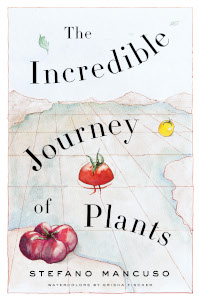
The Incredible Journey of Plants
In The Incredible Journey of Plants (Other Press Paperback, $17.99) Stefano Mancuso, an Italian neurobiologist and author, shares stories about how plants have thrived in varied and sometimes harsh environments around world. The original title was published in Italian in 2018 and the English translation was published in 2020.
The 158-page paperback book, peppered with watercolor illustrations by Grisha Fischer, was translated into English by Gregory Conti. Written in an easy to read, engaging yet stress free style the book is divided into six chapters: Pioneers, Combatants and Veterans; Fugitives and Conquerors; Captains Courageous; Time Travelers; Solitary Trees; Anachronistic, Like an Encyclopedia.
Described in a press release as “one of the world’s leading authorities in the field of plant neurobiology, which explores signaling and communication at all levels of biological organization,” Mancuso is a professor at the University of Florence who has published more than 250 scientific papers in international journals. His previous books include The Revolutionary Genius of Plants: A New Understanding of Plant Intelligence and Behavior and Brilliant Green: The Surprising History and Science of Plant Intelligence.
According to promotional materials Conti teaches English at the University of Perugia and is a regular contributor to Raritan. Recent translations include Seven Poems by Elisa Biagini, The Fault Line by Paolo Rumiz, and A Soldier on the Southern Front by Emilio Lussu.
Comments:
Filed Under: Books
Posted by Elena del Valle on September 28, 2022

The Cottage Fairy Companion
Photos: Yellow Pear Press
Artist Paola Merrill reads children’s books and posts video snippets of her life in a cottage in rural Washington State as The Cottage Fairy on YouTube.com. As of this writing a little over one million people follow her updates. In The Cottage Fairy Companion A Cottagecore Guide to Slow Living, Connecting to Nature, and Becoming Enchanted Again (Yellow Pear Press, $22.99), her first book, she shares her “meditations and practices.” From idea to completion the project required one year.
When asked about herself by email via her publisher she replied, “I spend my days painting in my cottage, taking long walks with my husband and dog, reading children’s books, and drinking lots of tea while curled up with my kitty! My goal is to make my art and work as earth conscious as possible, and to spread joy and wonder through all my media. In the same way that nature and stories inspire me, I want to encourage creativity and peace in others to share the light and beauty of this world.”
She wrote the book for “Anyone looking to slow down for some moments of peaceful reflection!” The 166-page softcover book published this year features her art in watercolor and ink pens. It is divided into four main sections by season: Spring, Summer, Autumn and Winter.

Paola Merrill, author, The Cottage Fairy Companion
When asked what she hopes to achieve by writing about living in a cottage she said, “To give readers a moment to slow down and reflect on the beauty of life around them. And maybe inspire them to simplify life and prioritize what brings them fulfillment and joy.”
How will she measure success in relation to the book? She said, “I am not actually trying to measure success. It has been a dream of mine to publish a book for a long time, so just getting it out is already a success to me!”
She relies on the publishing company for book promotion and makes announcements across her social medias channels. Fairy in the title refers to the name of her YouTube handle, “and references the magic and whimsy that inspired me to start my channel and creative journey.”
When asked what she means when she says mindful while gardening, baking, and other tasks in the book, she said “To be fully aware of the present moment, and reflect on the joys of simple living and activities as you take part in them. This is countercultural to the fast-paced hectic bustle of most daily routines our society promotes.”
Comments:
Filed Under: Books
Posted by Elena del Valle on September 14, 2022
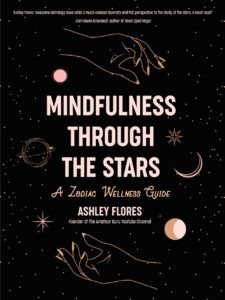
Mindfulness Through the Stars
Photo: Mango Publishing Group
Ashley Flores, who as of this writing has 172,000 subscribers on YouTube, where she posts content as the Amateur Guru, wrote Mindfulness Through the Stars A Zodiac Wellness Guide (Mango Publishing Group, $22.95). The 175-page hardcover book has a 2020 copyright.
The book, her first, is divided into an Introduction, a chapter for each sign of the zodiac as well as a chapter on mindfulness and one on self care. According to her biography the Canadian resident is an amateur astrologist.
When asked about the primary target audience for the book the author replied via email through a Mango representative, “While writing this book, I tried not to have a specific target audience in mind. Of course, I knew a large portion of the people choosing to purchase and read my book would be viewers of my youtube channel. These viewers are typically young adults, of all genders. However, I targeted my book towards people who value personal-development, mindfulness, self-care, and of course astrology lovers! I wanted to cater this book to people who have a basic understanding of zodiac signs, so that they could learn the potential that tuning into their zodiac signs energy can have on aiding them on their self-help journey!”
Regarding the amount of time the project required from idea to publication she said, “Prior to beginning the writing process, I worked closely with Mango to develop an editorial brief, come up with a name, a cover, and of course – a general idea of what the book could be. This process took a few months. I began writing the book in October 2019 and the final draft was submitted early May 2020. It was a much quicker process than I had imagined!”
When asked if she has plans for other titles she said, “Absolutely! I am planning to release a guided journal, as well as a second self-help book. I am also currently working on guided workbooks and worksheets.”
When asked her motivation in writing the book she said, “As a child and young adult, I had always had a passion for writing. I often wrote short stories, poetry, and scripts. It was always a goal of mine to release a book. Eventually, I channeled all of my creative energy into my youtube channel which gained the attention of Mango Publishing. They saw something in me, and presented the idea to me to write a book on Astrology. It all felt very aligned with my passions, and I happily decided to work with them on this book!”
“As a creative person, I have many goals and aspirations,” she said when asked what she hopes to achieve. “A few things I would love to achieve are writing a second book, becoming a life coach, success on both of my youtube channels, and using my platform and endeavours to help change the lives of others around me. I have a passion for helping others understand themselves and their true passions, and would love to see how far I can take that.”
How will she measure success in relation to the book? “If just one person can read my book and say it helped change their life for the better…That is success to me.”
Regarding ways and channels other than her own YouTube videos she uses to promote the book she said, “I promote my book mostly through my TikTok and Instagram, however – I bring it up in real life conversations as often as I can! I live in a big city and meet a lot of people, and always go out of my way to bring up my book as often as possible! People are very supportive and either purchase the book, or recommend it to a friend.”
When asked about the title and the chapter on self care she said, “To me, being mindful is to be intentional and aware. These are forms of self-care to me. Being intentional allows me to make sure that all of my actions are in alignment with who I am and what I want. When I take the time to be intentional, I find that I am able to tune into my higher self with ease. This is important to me because I strive to be the best version of myself daily. When I show up for myself, and others – I want to make sure I am reaching, or close to – my highest potential.”
Comments:
Filed Under: Books
























